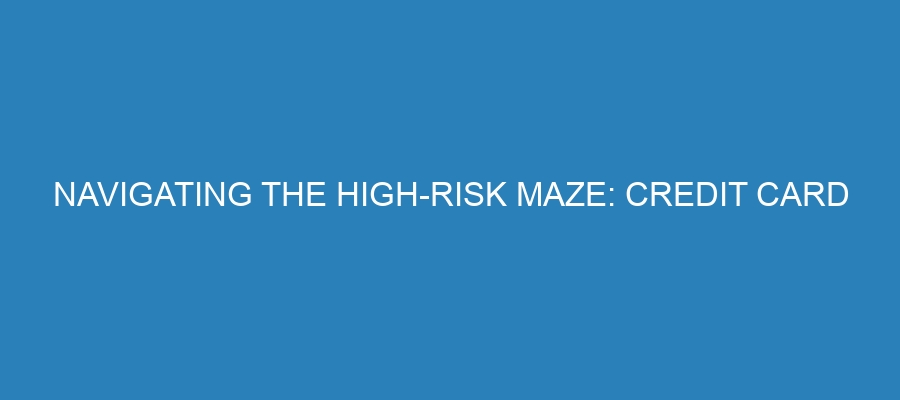In today’s fast-paced digital economy, businesses in traditionally high-risk industries often find themselves in a thick fog when it comes to credit card processing. These companies, which can span sectors from adult entertainment to e-commerce startups, face unique challenges when attempting to secure reliable payment solutions. If you’re in one of these industries and feel overwhelmed by the complexities of credit card processing, you’re not alone! This article will navigate the high-risk maze, shedding light on why your industry is considered high-risk and how you can successfully secure credit card processing solutions.
What Makes an Industry “High-Risk”?
Before delving into solutions, it’s vital to understand what categorizes an industry as high-risk. Payment processors view high-risk industries as those that pose a greater likelihood of chargebacks, fraud, or regulatory scrutiny. Some common characteristics include:
- High Chargeback Rates: If your industry typically sees consumers disputing transactions frequently, it raises red flags for processors.
- Reputation Issues: Businesses viewed as having questionable moral standings often find it challenging to secure payment processing.
- Legal Regulations: Industries like CBD, gambling, or adult entertainment come with various legalities, adding to the processing challenges.
- Fraud Potential: If your service or product can easily be counterfeited or misrepresented, your industry is likely to be classified as high-risk.
Understanding Your Options
Traditional Banks vs. High-Risk Processors
Most traditional banks shy away from high-risk businesses because they want to protect themselves from potential losses. However, specialized high-risk payment processors often welcome these businesses. These providers understand the unique challenges and risks involved and can offer tailored solutions.
Considerations for Choosing a Processor:
- Fees: High-risk processors sometimes charge higher fees due to the increased risk. It’s important to weigh these costs against the potential for increased revenue.
- Support: Look for processors that offer excellent customer service. Rapid response times and a dedicated representative can make a world of difference.
- Reputation: Research and select a company known for working with businesses in your industry. Companies like PaymentCloud and others offer specialized services tailored for high-risk industries.
Alternative Payment Solutions
-
ACH Transfers: A viable alternative to credit cards is to use Automated Clearing House (ACH) payments, which can be less prone to chargeback risk.
-
E-Wallets: Consider integrating e-wallet solutions like PayPal or Venmo, which can supplement credit card payments and appeal to tech-savvy customers.
-
Cryptocurrency: Some high-risk industries have turned to cryptocurrency for payments to bypass traditional processing. However, ensure you’re familiar with regulations.
Building Trust with Your Processor
Building a solid relationship with your payment processor can significantly impact your business’s success. Be transparent about your business operations, including sales volume, revenue projections, and customer demographics. This transparency can foster trust and lead to better processing terms.
The Importance of Compliance and Documentation
Navigating regulations should not be an afterthought. High-risk businesses must create a robust compliance strategy, which may include:
- Transaction Monitoring: Regularly monitoring transactions can help detect unusual activity.
- Documentation: Keep thorough records of all financial transactions to provide necessary documentation if chargebacks arise.
The Role of PCI Compliance
Security is paramount, especially in high-risk businesses. Adhering to Payment Card Industry Data Security Standards (PCI DSS) is essential. Maintaining compliance not only secures transactions but also builds trust with customers.
FAQs About Credit Card Processing for High-Risk Industries
1. Why is my business considered high-risk?
Your business may fall into this category due to its inherent risks for fraud, a high rate of chargebacks, or regulatory scrutiny.
2. Will all processors refuse to work with high-risk businesses?
Not all processors will refuse; however, traditional banks may hesitate. Specialized high-risk processors exist that can help.
3. How can I lower my processing fees?
Ensuring compliance, reducing chargeback rates, and maintaining a clear relationship with your processor can help negotiate lower fees.
4. What’s the best type of merchant account for my business?
A high-risk merchant account tailored to your business type is often the best option. Discuss your needs with a specialized provider.
5. Is it essential to have a chargeback reduction strategy?
Yes! A chargeback reduction strategy is crucial for minimizing risks and keeping your processing costs manageable.
Conclusion
Navigating the high-risk maze of credit card processing can feel somewhat daunting, but you don’t have to go it alone. Understanding the unique challenges of your industry, choosing the right processing partner, and implementing robust compliance strategies can all significantly bolster your chances of not just surviving, but thriving.
If your business is struggling to find a reliable credit card processing solution, look no further than Payminate.com. They specialize in helping high-risk businesses flourish with tailored merchant processing solutions. Don’t let your business fall victim to high-risk processing challenges—contact Payminate today and start paving the way to a seamless payment experience!

